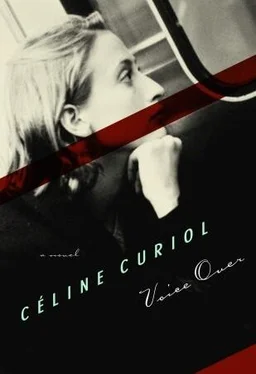Celine Curiol - Voice Over
Здесь есть возможность читать онлайн «Celine Curiol - Voice Over» весь текст электронной книги совершенно бесплатно (целиком полную версию без сокращений). В некоторых случаях можно слушать аудио, скачать через торрент в формате fb2 и присутствует краткое содержание. Год выпуска: 2008, Издательство: Seven Stories Press, Жанр: Современная проза, на английском языке. Описание произведения, (предисловие) а так же отзывы посетителей доступны на портале библиотеки ЛибКат.
- Название:Voice Over
- Автор:
- Издательство:Seven Stories Press
- Жанр:
- Год:2008
- ISBN:нет данных
- Рейтинг книги:5 / 5. Голосов: 1
-
Избранное:Добавить в избранное
- Отзывы:
-
Ваша оценка:
- 100
- 1
- 2
- 3
- 4
- 5
Voice Over: краткое содержание, описание и аннотация
Предлагаем к чтению аннотацию, описание, краткое содержание или предисловие (зависит от того, что написал сам автор книги «Voice Over»). Если вы не нашли необходимую информацию о книге — напишите в комментариях, мы постараемся отыскать её.
Voice Over — читать онлайн бесплатно полную книгу (весь текст) целиком
Ниже представлен текст книги, разбитый по страницам. Система сохранения места последней прочитанной страницы, позволяет с удобством читать онлайн бесплатно книгу «Voice Over», без необходимости каждый раз заново искать на чём Вы остановились. Поставьте закладку, и сможете в любой момент перейти на страницу, на которой закончили чтение.
Интервал:
Закладка:
That same evening, she checks the contents of the sports bag for the fifth and final time, and adds the umbrella. She is lifting her leg to step into a special London-departure bath, and just like that the telephone starts to ring. She rushes forward with little steps, holding one hand over her crotch, supporting her breast with an arm, stark naked in the middle of the living room. Yes hello, it’s Olivier Chedubarum. Talkative, in high spirits. She eventually understands that the photographs are ready and that he wants to show them to her. I’m off to London tomorrow. How she has adored saying those words, with a hint of weariness in her voice, as if it were all one to her, as if it were no more than a dull, routine occurrence that she was obliged to mention. It’s her revenge, a way of lifting her nose at the entire world, which continues to play its tricks, uncaring, and which has now delegated a single spokesman to her in the person of Olivier Chedubarum. With him? Yes, with him. She’s said it, she’s in heaven. Now someone will know they’re going away, alone, the two of them together. Olivier Chedubarum suggests meeting up that very evening so he can give her copies of the best photos. She hesitates, she has to get up early the next morning. But at that moment everything seems so perfect that she has no desire to deny herself anything or to act for purely rational reasons. A last little outing to mark the occasion, to celebrate her departure. The water in the bath is untouched and cold when she approaches the Père-Pinard, a café on the Place des Halles at seven o’clock.
She recognized the phrase. It’s my birthday, I’m forty today. She imagines. . the idea delights her; she’s about to say to him, look, I know you, realizing that he said it on purpose to pull her leg, to make a joke about the past, to invite her along to the café. She turns around: Momo isn’t talking to her but to a tall, fine-looking girl who is firmly shaking her head. And when his eyes sweep over the place where she is standing, he doesn’t stop, doesn’t notice her. Point taken. That day, Momo had stumbled onto her by chance, because she had been the one to turn around, not because of who she was. She doesn’t dare go over; she keeps on walking in the direction of the café, trying hard not to think about it any more.
A cardboard folder is on the table. Olivier Chedubarum stands up, she sits, the waiter sets down two glasses of wine in front of them, the file is opened. What Olivier Chedubarum then shows her causes her to gape. She sees a sister, a cousin, a likeness, but it’s not her, not fully. The look in the eyes is hers, but not the expression, which is fierce, severe, and doesn’t correspond to anything in herself. Perhaps others have always seen her like this and she simply hasn’t known it. She picks up one of the photos to study it more closely. There is a small luminous dot, slightly out of focus, the drop of water that had landed on her upper chest and left a trace on the film before it fell. The tomatoes are the tomatoes she had seen in Olivier Chedubarum’s hands. And yet her face is not the face she thought she had presented to the photographer. Gone is the sense of well-being she had experienced in the glow of the enormous lamps. Nevertheless, it had seemed to last for a long time, long enough to be captured on film. You don’t like them? It doesn’t seem to be me. Olivier Chedubarum bursts out laughing. You look good, though. A nice way to say the image flatters her, that she looks better in it than in real life. That’s not what I mean. But how to explain it to him? She wonders if the result would have been the same if the pictures had been taken by a different photographer. It might be Olivier Chedubarum’s eye that has transformed her, but how can she be sure? Actually, you can keep them. Olivier Chedubarum shakes his head. I’ll end up believing you think I’m a bad photographer. She doesn’t know a thing about photography, she’s in no position to judge, it’s not that, it’s just. Take them anyway, stick them in a drawer, one day you’ll wind up liking them. She shrugs her shoulders. After all, she’s off to London tomorrow, that’s what counts, the photographs are of no importance. To please Olivier Chedubarum, she tucks the folder away in her bag. He then orders another round and starts telling her about how he covered the student riots in May ’68 and managed to have his first photographs published in the national press.
She has lost track of how long she’s been listening to Olivier Chedubarum. Yawns twist her mouth out of shape, but she is unable to control them. She has had several glasses of wine, or maybe only one, which she is finishing off now. She has to go home. Her legs are dragging her down. She is in a taxi. She has said goodbye to Olivier Chedubarum, she no longer remembers what he said to her. This time tomorrow she’ll also be in a taxi, but in London, with him. As she lies down on her bed, she thinks of a bushy-haired puppet called Big Ben.
She opens her eyes. Remembers. Sticks the face of the alarm clock up against her bleary eyes. Several long seconds go by before she can focus on the slender hands. When she finally makes them out, the world around her suddenly shrinks, leaving only the narrowest slit through which to try and escape the inevitable. 8.10, ten past eight in the morning. Horrible horror. How could she have let it happen? If she had the time, she’d punish herself by giving her head a good bang against her bedroom wall, but she only has twenty minutes to get to the station. She puts on the clothes she finds on the floor, then her coat, slings the sports bag and her handbag over her shoulder, looks for her keys, hears objects dropping to the floor without knowing what they are, finds her keys on the kitchen table, battles with her feet and shoes to get the former into the latter, glimpses 8:15 somewhere, opens the door, locks the door, rushes down the stairs, in the street, quick glance to the right, to the left, hesitates, searches her mind for the shortest route to the station, begins to run. The bags knock against her sides, she does her best to hold them in place, but the tighter her grip the harder it is to run. She brushes up against several passers-by, who give her long stares, she would like to shout insults at them, she sprints at the crossings to avoid red lights. Her heart is knocking around in her chest. Fire spreads across her forehead, temples, cheeks. A stitch is stabbing her in the belly, she breathes out forcefully to soften the pain. Her legs are weighed down by the alcohol still circulating in her blood, her stomach is begging for food, her brain distracts her by churning out thoughts. Don’t miss that train, no matter what, don’t stop, get as far as customs, want it enough to make it, even if you have no more breath, keep running until the end, until the meeting place, run, don’t stop, find him, go faster, faster still, get there, don’t miss that train. Her métro pass isn’t in her bag, her métro pass is in her bag. She feeds her ticket into the machine and starts running again. People are in front of her, they don’t get out the way, they’re stupid and slow, wrapped up in themselves, wearing earphones, deep in conversation, they all want to stop her from getting there. Excuse me. She calls out the words from a distance so they’ll reach their target before she does and she can run past the obstacles without slowing down. She has to stop on the platform to wait for the métro. The tracks go all the way to the station. She’d climb down into the tunnel and start running in the dark and the damp to get there on time. The beating of her heart resounds in her eardrums, every fold of her skin is brimming with sweat. The whoosh of the train, the approaching headlights. She gets on. She would like to do something to make the ride go faster. She forces herself to catch her breath, she’s bright red. Several passengers watch her as she bends over, hands on her knees. Finally the letters “gare du Nord” glide past through the windows. The doors open. She runs out onto the platform, up the escalator, along the corridors, spots the signs marked “Eurostar,” she knows the way, she’s on home ground, she’s been here hundreds of times, she’s about to collapse. She enters the station concourse. People, too many people, people everywhere. She threads her way, avoiding the groups that come streaming towards her, the kids lounging around on the floor. Don’t miss the train, so close. She looks up. The clock shows 8.55. Impossible, that can’t be right, she keeps going, staggers up the last steps, barely ten yards to go before customs. The platform is empty. No one, not a passenger in sight, he’s nowhere to be seen, he isn’t there, no one but the customs people in their glass cages. She goes over. As if from thin air, a woman in a blue uniform rises up in front of her. Boarding is over, Miss. She has no more breath, no more saliva, no more words. She puts out her hand, her head is spinning, her ears abuzz. You can’t go through, boarding is over. Do you hear me?
Читать дальшеИнтервал:
Закладка:
Похожие книги на «Voice Over»
Представляем Вашему вниманию похожие книги на «Voice Over» списком для выбора. Мы отобрали схожую по названию и смыслу литературу в надежде предоставить читателям больше вариантов отыскать новые, интересные, ещё непрочитанные произведения.
Обсуждение, отзывы о книге «Voice Over» и просто собственные мнения читателей. Оставьте ваши комментарии, напишите, что Вы думаете о произведении, его смысле или главных героях. Укажите что конкретно понравилось, а что нет, и почему Вы так считаете.












